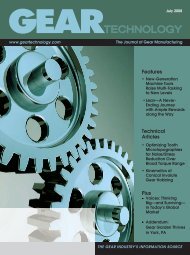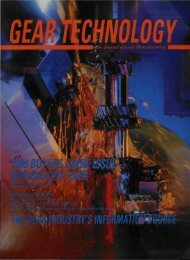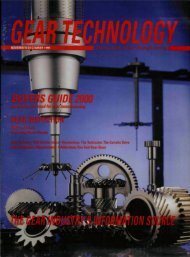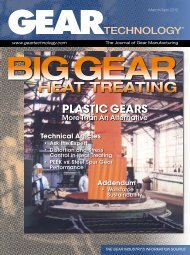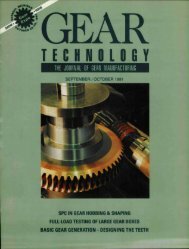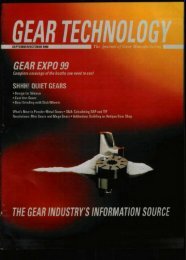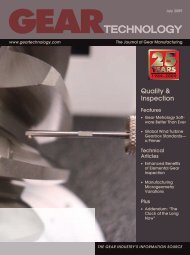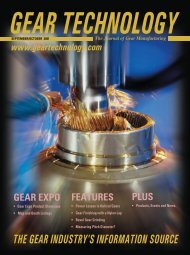Download PDF - Gear Technology magazine
Download PDF - Gear Technology magazine
Download PDF - Gear Technology magazine
You also want an ePaper? Increase the reach of your titles
YUMPU automatically turns print PDFs into web optimized ePapers that Google loves.
Lee and Will Decker, senior engineer, discuss the Universal Transmission at the<br />
white board (courtesy of VMT).<br />
automobiles. We’re excited about the<br />
possibility that an infinitely variable<br />
transmission could make an electric<br />
Ford F-150 a reality and offer a significant<br />
energy savings to the electric,<br />
hybrid or conventional versions,”<br />
Sutherland says.<br />
At the company’s website (www.<br />
moongears.com), the Universal<br />
Transmission development process is<br />
detailed along with a series of questions<br />
and answers that describe the<br />
benefits versus a standard gearbox,<br />
automatic transmission or CVT.<br />
The company also goes into<br />
great detail on the advantages of the<br />
Universal Transmission in the semitruck<br />
market. About 50 percent of all<br />
oil for vehicles is consumed by trucks.<br />
If the Universal Transmission is utilized<br />
in a semi truck, fuel usage could<br />
rise from 5 mpg to perhaps a high of<br />
6.5 mpg just from keeping the engine<br />
running in its “sweet spot” and never<br />
having to shift. Every time you shift,<br />
you disconnect the engine from the<br />
load, and you lose momentum or<br />
inertia. Going uphill requires dramatic<br />
uses of fuel just to recapture that<br />
momentum at every gear. Fuel will be<br />
saved because there is no clutch and<br />
the transmission is constantly engaged.<br />
Save fuel in trucks and you make a<br />
far stronger impact than saving fuel in<br />
cars. With an improvement of 5 mpg<br />
to 6.5 mpg in the big rigs, and more in<br />
smaller trucks, some of which could<br />
have electric or hybrid motors, there<br />
could be a 15 to 25 percent reduction<br />
of the fuel consumed in U.S. vehi-<br />
40<br />
GEARTECHNOLOGY March/April 2010 www.geartechnology.com



